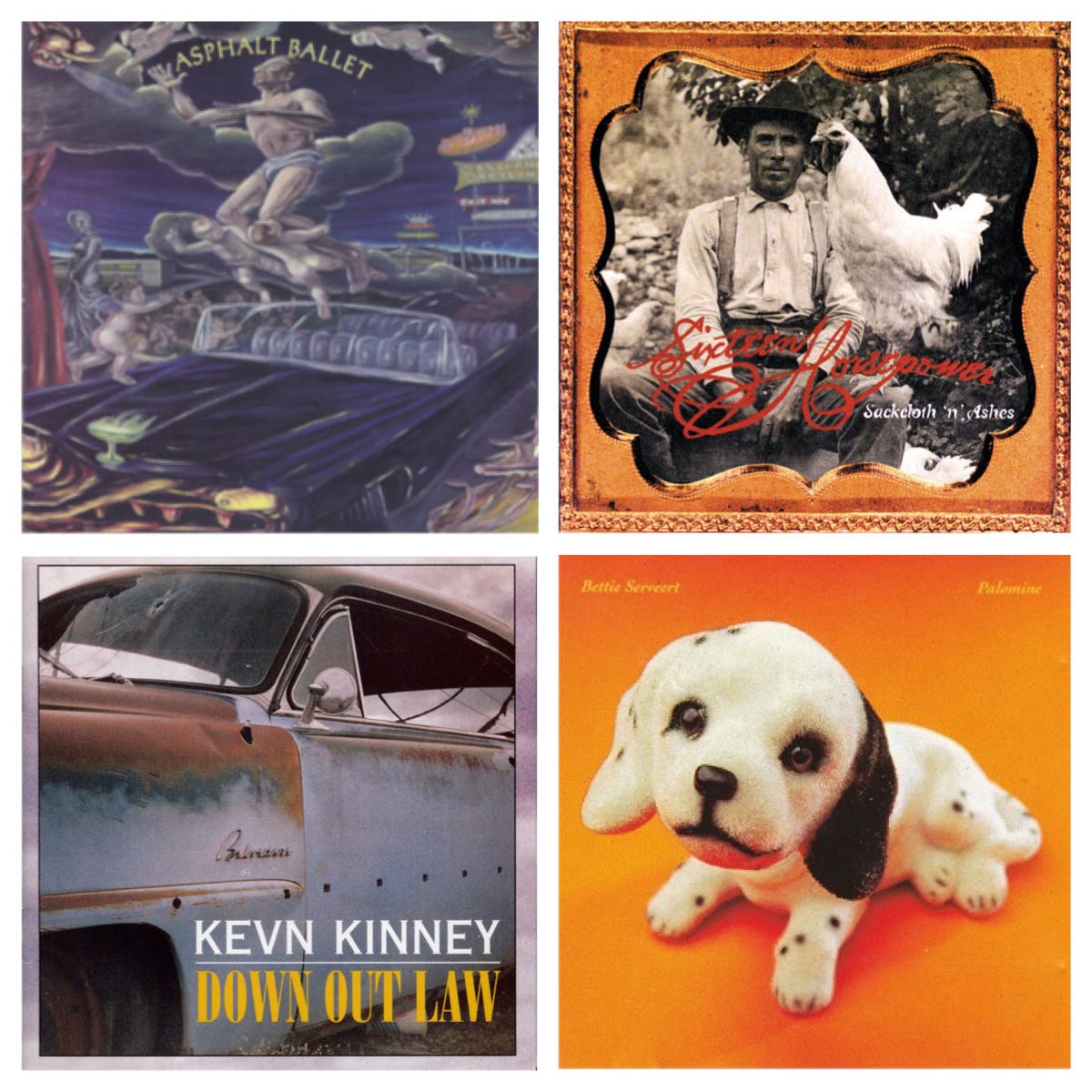Four 90s Albums the Music Industry Tried to Forget
October tournament features Asphalt Ballet vs Nevermind, Kevn Kinney’s label rebellion, Holland’s best-kept secret, and America’s most haunted folk rock
Four members of the Dig Me Out community have thrown down their gauntlets for this month’s 90s Rock Tournament, each backing an album that deserves serious consideration. These aren’t your typical Rolling Stone “Best of” picks—these are the deep cuts, the overlooked gems, the albums that only true believers know deserve the crown.
Cast your vote below and suggest your own underrated 90s masterpiece for next month’s tournament!
Kevin Kinney - Down Out Law (1994)
Eric Peterson knows what he’s talking about when he suggests this slice of authentic Americana. After Drivin’ n’ Cryin got squeezed by label pressure to drop their rootsier material from their 90s albums, Kevin Kinney went rogue. Down Out Law became the sanctuary for all those country/blues/folk songs that didn’t fit the major label mold—and thank goodness for that rebellion.
This is gas station prophet wisdom distilled into 13 tracks of pure honesty. While his main band was chasing radio play, Kinney was crafting songs like “Eye Of The Hurricane” and “Chattahoochie Coochie Man” that sound like they were written in a roadside diner at 3 AM. The raw authenticity Eric mentions hits exactly right—this album captures the restless spirit of mid-90s America without any of the polish or pretense.
Asphalt Ballet - Asphalt Ballet (1991)
Keith P Miller zeroes in on the essential tragedy of this Virgin Records release—big, thick, bluesy hard rock that deserved better than its timing. Released just one week before Nevermind dropped and changed everything, Asphalt Ballet represents the last gasp of a sound that was about to be swept away.
The comparison to Circus of Power and Spread Eagle is spot-on; this is blue-collar rock with muscle and conviction. Gary Jeffries’ vocals and the dual guitar attack of Julius Ulrich and Danny Clarke create exactly the kind of hefty sound Keith describes. Yes, the hooks could be stronger—that’s a fair critique—but sometimes raw power trumps pop sensibility. “Soul Survive” managed to compete against Ozzy and The Cult on viewer polls for two months, proving this band had something real. They just had the misfortune of existing in the wrong historical moment.
Sixteen Horsepower - Sackcloth ‘n’ Ashes (1996)
Patrick Testa absolutely nails the unsettling brilliance of this A&M Records nightmare. This isn’t alt-country—this is something far more disturbing and magnetic. David Eugene Edwards crafted an album that sounds like it was recorded in a haunted barn during a biblical plague.
The “Ghost Riders in the Sky” comparison Patrick makes is perfect; this entire album feels like that song’s darkest fever dream expanded into a full statement. Edwards’ use of banjo, fiddle, and his tortured vocals creates an atmosphere so authentic it’s almost archaeological. The Denver band managed to make old-time music that doesn’t feel like cosplay—it feels like genuine communion with America’s most troubled spirits.
Bettie Serveert - Palomine (1992)
Bob Ramakers from the Canary Islands brings us this Dutch masterpiece that Rolling Stone called “untamed and free as pop gets” in their original four-star review. While everyone was fixated on the Seattle sound, Bettie Serveert delivered something that transcended geography and trends.
Carol van Dijk’s vocals carry that perfect combination of vulnerability and strength that made this album an instant college radio classic. The comparison to Chrissie Hynde works, but there’s something more raw and immediate in van Dijk’s delivery. Palomine proved that great guitar pop could come from anywhere—the Netherlands included—and that melodic sophistication doesn’t require sacrificing emotional intensity.




Ooh wow.. I remember liking Betty Serveert a quarter century ago and really haven't listened to her since. I just checked and I have a few of her CDs but not this one. She'll get my vote, it will give me reason to go back and listen again.